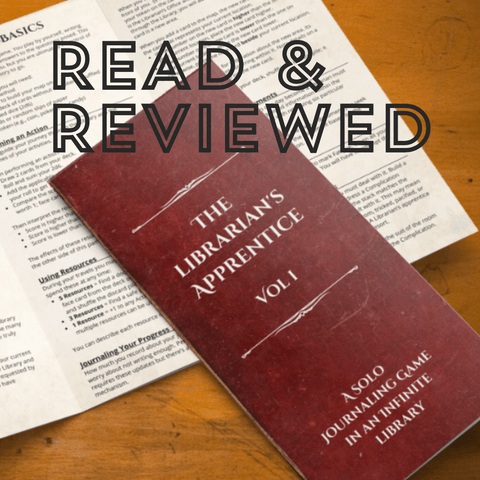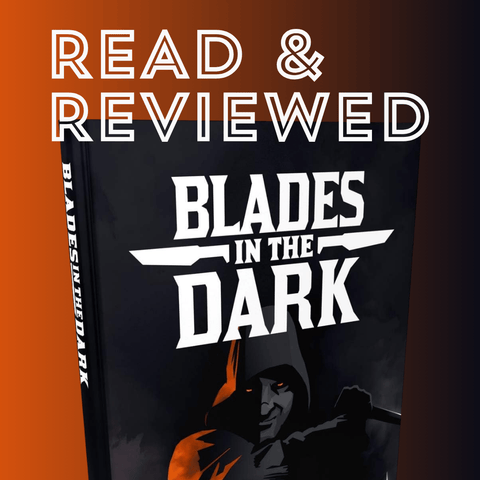By Meghan Ellis
“Infinite, ever-shifting, and sometimes dangerous, the Library exists in the space between worlds and times. Among the many who call it home are the Librarians, and only those who truly understand it may join their ranks. You seek to do so.”

Answer the call of the page with The Librarian’s Apprentice, a solo game for anyone who has ever dreamed of exploring the depths of a mythical library. The task at hand, should the apprentice choose to accept it, is to find six documents scattered throughout the library in a single day, aided by a loyal familiar and sometimes thwarted by the Great Library itself.
How does it play?
Created by Dan Bronson-Lowe, this is a journaling experience that uses the Guided by Firelights system to develop a solo-driven narrative. Players will need a journaling method, a flat surface, a deck of cards and 2d6, along with a token that represents their apprentice. As the Firelights system works by building a map from drawn cards, I’d recommend adding a method of sketching out the library blueprints, whether that’s on a battle map or sheet of grid paper (or, if you’re fancy, a purpose-made RPG notebook), as the layouts quickly become labyrinthine.
To begin playing, there are simple prompts for creating a character, which can be noted down on the lovely bookmark character sheet. Beyond these chosen truths, players are encouraged to flavour their apprentice however they wish. Unlike some solo RPGs, I found the truths added interest to character creation without trying to emulate multiplayer storytelling, functioning primarily as a way to solidify the library setting. Each choice - background, community and the library itself - provides a clear motive for the apprentice without relying on character interaction to make them relevant.
Gameplay revolves around actions, which are performed by drawing two cards, rolling 2d6 and adding one of three skills to the score to provide a result. Fittingly, the apprentice is equipped with Navigation, Research and Lore skills, and the familiar offers an additional bonus point. Results are scored as a pass (light), neutral (shadow) or fail (darkness), though The Librarian’s Apprentice is less inclined to give an outright fatigue penalty than the original Firelights system.

The fatigue mechanic is still present, and offers a sense of urgency as the apprentice must find six documents before succumbing to their exhaustion for the day. I enjoyed balancing adventuring with trying to retain stamina, especially as the familiar can take one for the team and absorb a single point. Fatigue feels like a simple way of ending a run without it feeling unfair, though I did have a few close calls; no thanks to the persnickety patron I encountered in a room full of riddles. Thank goodness for the Inscrutable Coffee resources found throughout the halls, the saviour of many a harried Librarian.
As a whole, the game steers away from failure, though when travelling between or researching rooms within the library a darkness score will result in a complication. These must be resolved before exploration can continue, and can lead to a game over. One of the neat things about The Librarian’s Apprentice is that complications don’t necessitate combat, emphasizing the all-ages nature of the game. In my playthrough, I encountered The Thing Below, a boss monster archetype that my apprentice simply ran away from thanks to a handy set of keys uncovered during earlier exploration.
Like this, the game spends a lot of time on stimulating the player's worldbuilding muscles, which ensures that the story takes place in a different library every time. Many solo games provide a static setting and motive to experience, but the shifting state of the Great Library and the dice-roll gameplay ensures that each run reveals different secrets.
Distributing stats differently on subsequent playthroughs can also offer novelty, leading to a surprisingly deep replay potential.
Who is it for?
Fundamentally, this is a game for daydreamers and library lovers. Inside the old-school file mailer there are three trifold volumes containing the rules, events and dramatis personae, alongside bookmark character sheets and a book delivery chart with some humorously overdue loans. My personal favourite inclusion is the library card, the treasured possession of many a bookworm. It’s not needed for gameplay, but this and the acknowledgements inside the first volume really highlight the creator’s love for the genre.

Volumes two and three come with rollable tables to help guide the story: players can roll to discern the nature of a room, or how the document presents itself, or even the quirks of a random patron lurking amongst the dusty shelves. I made use of the second volume extensively throughout my playthrough, creating a rich library with rooms ranging from coral reefs to ephemeral halls of dead statues.
The beauty of The Librarian’s Apprentice lies in its ability to create a wondrous and sometimes silly story from this randomness. In one room, a shifting garden of children’s stories, players might find a document in the undulations of a butterfly. In the next, smelly eggs could conceal a patron with mismatched socks. It’s this absurd unpredictability that adds appeal for players of all ages. In fact, The Librarian’s Apprentice is an excellent introduction to this style of play, and could help parents to guide their children through a journaling experience. Bronson-Lowe has streamlined many aspects of the original system to ensure it’s easy to understand for younger or inexperienced players, but there’s still plenty of meat on the bone for tried and tested TTRPGers.
Another beginner-friendly element is the extensive rollable tables, which work in tandem with the concise mechanics to ensure players are unlikely to struggle with what to do next. I only used the Ask A Question action once, to query whether the next room would contain a document after an extended period without drawing a document room. Narratively, this worked as I’d just resolved a complication with an angry library spirit, who was pacified with a promise to find the lost document in question. In a journaling experience like The Librarian’s Apprentice, imagination and creative problem solving go a long way to achieving success.
What’s the vibe?
The Librarian’s Apprentice is all about imaginative play. Players are encouraged to write as much or as little as they want, and I’d recommend adding doodles to the journal as a way to deepen the gameplay. Many of the descriptions are wonderfully evocative - smelly eggs, again - and present a creative opportunity for younger players and the artistically inclined to practice their worldbuilding skills.

The tables sometimes generate bizarre results, but a large part of the fun lies within trying to visualize the outcomes. How might a room full of cavernous star charts, for example, contain a wealth of taxidermy? Or how might the patron with an interest in ancient poetry about get rich quick schemes hinder the search? These are the questions that the Great Library presents, and it’s up to apprentices to discover the answers.
Although it’s a solo experience, the apprentice is always accompanied by their familiar, which staves off much of the potential for horror. I wanted to foster the sense of the library as a close-knit community, so we were part of a royal order that travelled its halls in search of secrets. And though there’s the potential for danger it’s never truly mortal peril: even The Thing Below leaves polite notes when it accidentally devours sections of the archives.
Should you play it?
The Librarian’s Apprentice is one to play when other ongoing campaigns get tough, or when there’s an afternoon in need of some absurd-but-cozy fantasy. Drawing from such rich inspiration as the works of Studio Ghibli and the far-darker Stygian Library, this feels like a love letter to the portal adventure and the idea of being drawn - sometimes literally - into the world of books. It’s a story told by yourself, to yourself and for yourself, and for booklovers it certainly deserves a place in their library.
Wonderful and whimsical, The Librarian’s Apprentice is an escape from the genre’s tendency to cultivate sinister experiences, providing players with a Pratchett-esque world in which they can delve for documents and meet ridiculous people along the way.

Meghan Ellis is a Glasgow-based journalist covering internet culture, anime, gaming, and SFF. She’s appeared in IGN, Kotaku, All the Anime and on the BBC, where she told the general public to go to Comic-Con. She participates in game jams over on https://meghan0n.itch.io/ as a jack-of-all-trades artist and writer. Read more over on https://www.meghanon.co.uk/.





Comments (0)
There are no comments for this article. Be the first one to leave a message!